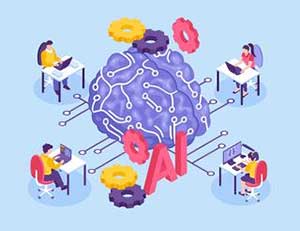Date : 14/06/2023
Relevance : GS Paper 3 : Science and Technology
Key Words: AI, OECD, Human Values, G7, Democracy
Context-
- The annual Group of Seven (G-7) Summit, held in Hiroshima, Japan from May 19-21, 2023, introduced the Hiroshima AI Process (HAP) as a means to regulate Artificial Intelligence (AI).
- The HAP aims to address the challenges of generative AI and establish inclusive AI governance in alignment with values such as freedom, democracy, and human rights.
Overview of the Hiroshima AI Process:
- The G-7 Leaders' Communiqué emphasized the need for international discussions on inclusive AI governance and interoperability, guided by shared democratic values.
- The HAP, organized through a G-7 working group, in collaboration with international organizations like the OECD and GPAI, will engage in discussions on various aspects of generative AI.
- These discussions may cover governance, protection of intellectual property rights, transparency promotion, countering foreign information manipulation, and responsible utilization of AI technologies. The HAP is expected to conclude its deliberations by December 2023.
Alignment with Values and Norms:
- The HAP recognizes the importance of aligning AI development and implementation with values such as freedom, democracy, and human rights.
- It emphasizes the principles of fairness, accountability, transparency, and safety in regulating AI. While the exact meaning and implementation of "procedures that advance transparency, openness, and fair processes" require further clarity, the emphasis on these values indicates a departure from a purely state-centric perspective.
Inclusivity and Multi-Stakeholder Involvement:
- The HAP acknowledges the significance of involving multiple stakeholders in AI regulation through "multi-stakeholder international organizations" and "multi-stakeholder processes."
- This approach aims to ensure fairness, transparency, and broader representation in shaping AI governance. However, given the divergence among G-7 countries in regulating AI risks, achieving a consensus on key regulatory issues remains a significant challenge for the HAP.
Potential Outcomes and Impact:
- The HAP can lead to divergent regulations based on shared norms, principles, and values among G-7 countries. While there is a possibility of some convergence on certain issues, significant discord may persist.
- An example of how the HAP can facilitate progress is through clarifying the relationship between AI and intellectual property rights (IPR), specifically addressing the fair use of copyrighted materials in AI training datasets. By establishing guiding rules and principles, the HAP can contribute to a global consensus on this matter.
The Vision for Trustworthy AI:
- The G-7 communiqué recognizes that the common vision and goal of trustworthy AI may vary across its members. While harmonizing regulations may not be the primary objective, the HAP emphasizes collaboration with other countries, including OECD members, and the development of an interoperable AI governance framework.
- This indicates the need for the HAP to respond to the concerns of other country-groups and international bodies involved in setting technical standards for AI.
Conclusion:
The establishment of the Hiroshima AI Process highlights the global significance of AI governance. Through inclusive discussions and collaboration, the HAP aims to regulate AI development and implementation in alignment with values such as freedom, democracy, and human rights. While challenges remain in achieving consensus and avoiding complete discord among G-7 countries, the HAP has the potential to shape the future of AI governance on a global scale.
Probable Questions for mains exam-
- Question 1 : Discuss the significance of the Hiroshima AI Process (HAP) in regulating Artificial Intelligence (AI) on a global scale. (10 Marks, 150 Words)
- Question 2 : Examine the importance of transparency, fairness, and accountability in developing responsible AI, as emphasized in the HAP. (15 Marks, 250 Words)
Source: The Hindu







